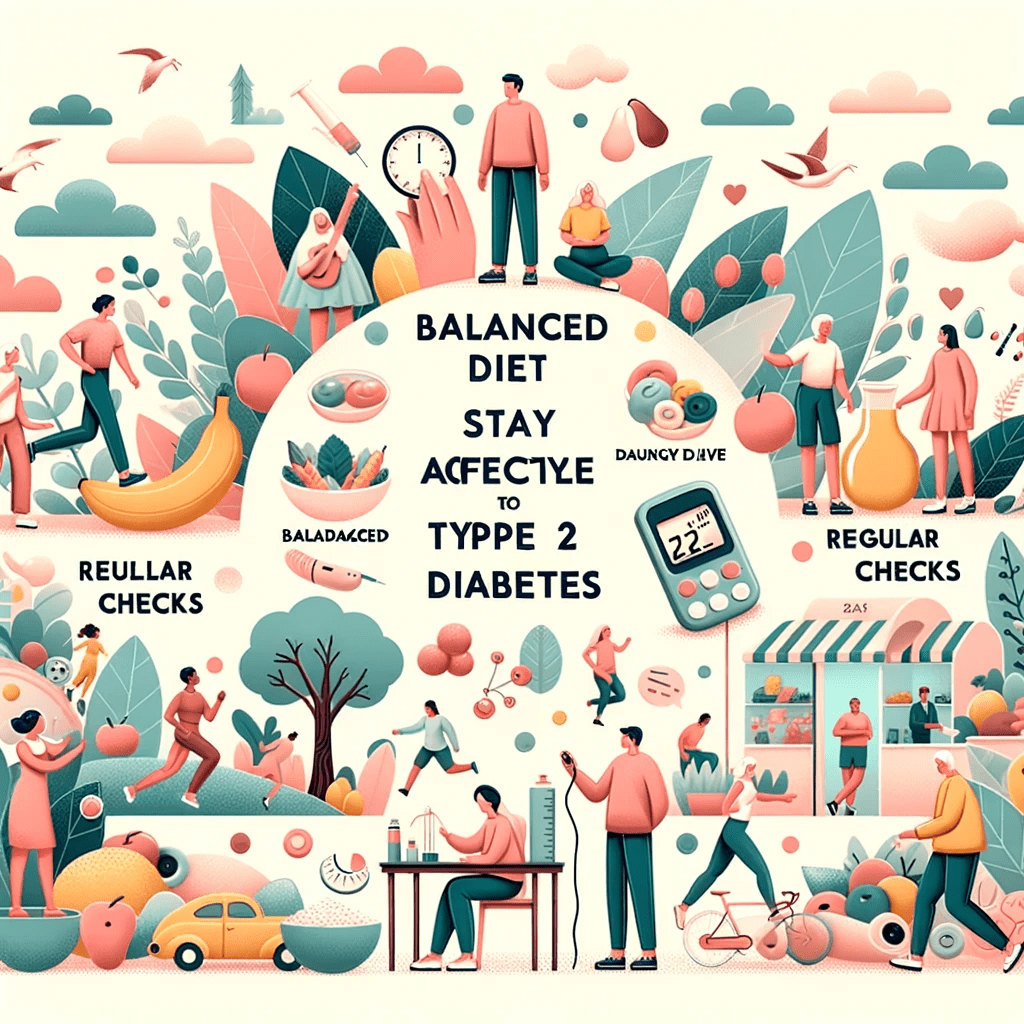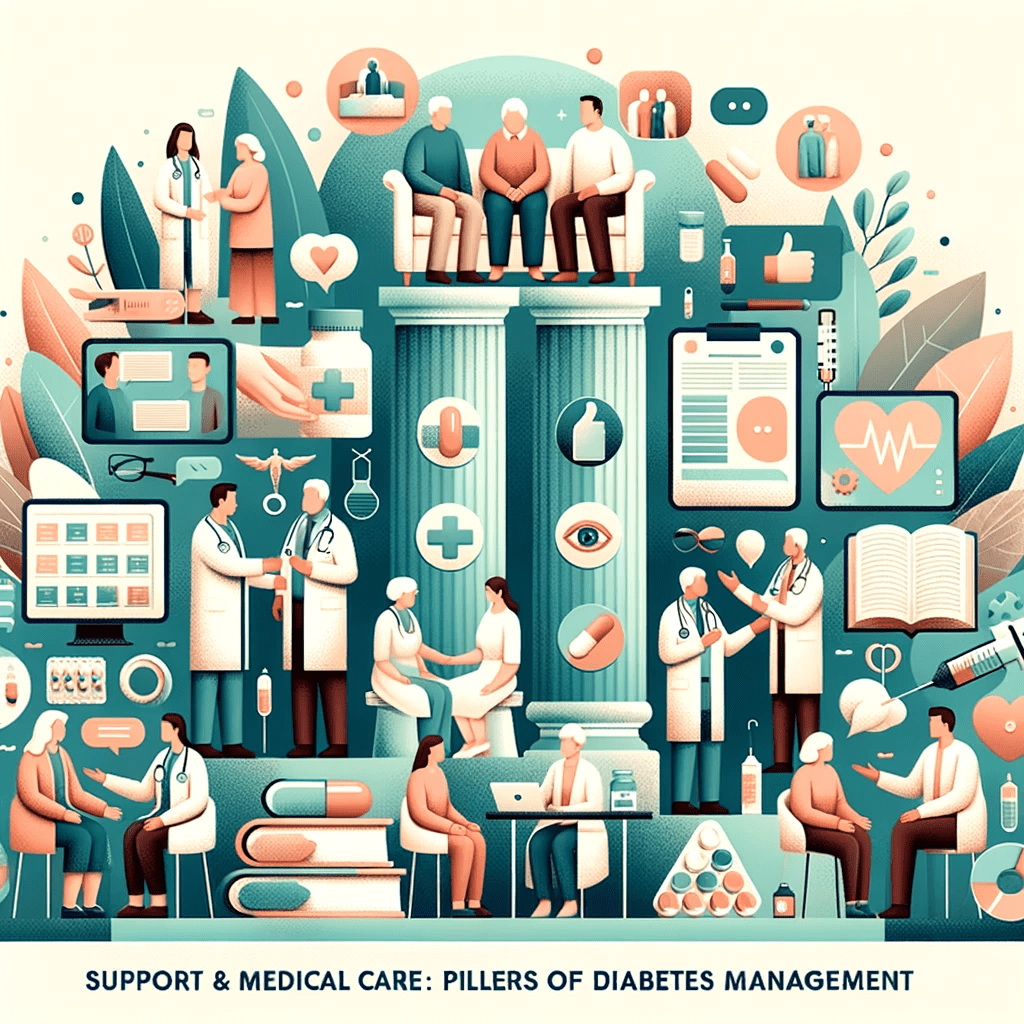How Does a Person Manage Type 2 Diabetes: US Guide

Type 2 diabetes is a chronic condition affecting millions of people in the United States. It occurs when the body's cells do not respond normally to insulin, resulting in high blood sugar levels. Managing type 2 diabetes involves lifestyle changes, including healthy eating and regular exercise. Some cases may require medication or insulin therapy. Regular monitoring of blood sugar levels and maintaining control of blood pressure and cholesterol are crucial. Support and education are available to assist individuals with managing their condition and preventing complications. How Does a Person Manage Type 2 Diabetes: US Guide


Understanding Type 2 Diabetes - How Does a Person Manage Type 2 Diabetes: US Guide
Type 2 diabetes is a chronic condition that affects millions of Americans. It occurs when the body's cells do not respond properly to insulin, leading to high levels of sugar in the blood. Understanding the key aspects of type 2 diabetes is crucial for effective management and prevention of complications.
What is Type 2 Diabetes?
Type 2 diabetes is a metabolic disorder characterized by insulin resistance. This means that the body's cells do not utilize insulin effectively, resulting in elevated blood sugar levels. Unlike type 1 diabetes, which is an autoimmune disease, type 2 diabetes is largely influenced by lifestyle factors such as diet, physical activity, and obesity.
Causes of Type 2 Diabetes
The development of type 2 diabetes is influenced by a combination of genetic and environmental factors. While a family history of the condition can increase the risk, lifestyle choices significantly contribute to its onset. Poor eating habits, sedentary lifestyle, obesity, and age are among the common risk factors associated with type 2 diabetes.
Symptoms of Type 2 Diabetes
The symptoms of type 2 diabetes often develop gradually and may go unnoticed for a long time. Common symptoms include increased thirst, frequent urination, unexplained weight loss, fatigue, blurred vision, and slow-healing wounds. Recognizing these symptoms is crucial for timely diagnosis and management of the condition.
Risks and Complications of Type 2 Diabetes
Untreated or poorly managed type 2 diabetes can lead to various complications. These may include heart disease, stroke, kidney disease, nerve damage, vision loss, and foot problems. It is essential to understand and address the risks associated with the condition to prevent these complications from occurring.
Diagnosis and Screening for Type 2 Diabetes
Diagnosing type 2 diabetes involves blood tests that measure blood sugar levels. Depending on the results, additional tests may be conducted to confirm the diagnosis. Regular screening for diabetes is important, especially if there are risk factors present. Early detection allows for timely management and reduces the risk of complications.
Managing Type 2 Diabetes - How Does a Person Manage Type 2 Diabetes: US Guide


Managing type 2 diabetes requires making significant changes to your daily routine and adopting a proactive approach to your health. By incorporating healthy eating, physical activity, medication management, insulin therapy, and blood sugar monitoring, you can effectively manage your condition and reduce the risk of complications.
Healthy Eating for Type 2 Diabetes
A nutritious diet plays a crucial role in managing type 2 diabetes. Focus on consuming a variety of fruits, vegetables, lean proteins, whole grains, and healthy fats. Limit your intake of processed foods, sugary beverages, and high-fat foods. Consider working with a registered dietitian to create a personalized meal plan that fits your dietary preferences and needs.
Physical Activity and Exercise
Regular physical activity helps control blood sugar levels, improves insulin sensitivity, and promotes overall health. Aim for at least 150 minutes of moderate-intensity aerobic exercise, such as brisk walking or cycling, per week. Additionally, incorporate strength training exercises to build muscle mass and further enhance your metabolic health.
Medications for Type 2 Diabetes
In some cases, managing type 2 diabetes may require the use of medications. Oral medications, such as metformin, help lower blood sugar levels. Your healthcare provider may prescribe other medications, including insulin sensitizers or medications that stimulate insulin production. Adhere to your medication regimen as prescribed and regularly review your treatment plan with your healthcare team.
Insulin Therapy for Type 2 Diabetes
If lifestyle changes and oral medications are not sufficient to control your blood sugar levels, your healthcare provider may introduce insulin therapy. Insulin injections or the use of an insulin pump can help regulate your blood sugar. Work closely with your healthcare team to determine the appropriate type and dosage of insulin for your needs.
Blood Sugar Monitoring and Control
Regular monitoring of your blood sugar levels is crucial to managing type 2 diabetes effectively. Use a blood glucose meter to check your levels at home and keep a record of your results. Reviewing your blood sugar trends with your healthcare provider will help make necessary adjustments to your treatment plan. Implement lifestyle modifications and medication changes as recommended to achieve and maintain target blood sugar levels.
- Monitor your blood sugar levels regularly.
- Follow a healthy diet plan tailored to managing type 2 diabetes.
- Incorporate regular physical activity and exercise into your routine.
- Take prescribed medications as directed.
- Work with your healthcare team to determine the appropriate insulin therapy.
- Keep a record of your blood sugar levels and share them with your healthcare provider.
By actively managing type 2 diabetes through these strategies, you can lead a healthy and fulfilling life while minimizing the risk of complications associated with this condition.
Support and Education for Type 2 Diabetes - How Does a Person Manage Type 2 Diabetes: US Guide


Support and education play a crucial role in managing type 2 diabetes. By understanding the condition and learning how to effectively care for themselves, individuals can take control of their health and prevent complications.
Diabetes Care and Self-Management
Diabetes care involves a combination of self-management techniques and regular monitoring. This includes:
- Monitoring blood sugar levels consistently to ensure they are within the target range.
- Adopting healthy eating habits, such as consuming a balanced diet with appropriate portion sizes and limiting the intake of sugary and processed foods.
- Engaging in regular physical activity to improve insulin sensitivity and maintain a healthy weight.
- Taking prescribed medications as directed and keeping up with medical appointments for check-ups and adjustments.
Kidney Disease and Type 2 Diabetes
People with type 2 diabetes are at an increased risk of developing kidney disease. It is crucial to take proactive steps to protect kidney health, such as:
- Maintaining good blood sugar control to reduce the risk of kidney damage.
- Managing blood pressure levels within the recommended range through lifestyle modifications and medications.
- Having regular kidney function tests to detect any signs of kidney disease early.
- Following a kidney-friendly diet, which may include reducing sodium and protein intake.
Working with Your Healthcare Team
Collaborating with a healthcare team is essential for effective diabetes management. This involves:
- Regularly visiting healthcare professionals, including doctors, nurses, dietitians, and diabetes educators.
- Seeking advice and guidance for managing blood sugar levels, making lifestyle changes, and addressing any concerns or challenges.
- Discussing treatment options, such as medication adjustments or insulin therapy, based on individual needs.
- Ensuring all healthcare providers are informed about other conditions, medications, and treatments to avoid potential complications.
Preventing and Managing Complications
Prevention and early intervention are crucial in minimizing the risk of complications associated with type 2 diabetes. This includes:
- Regularly monitoring and managing blood sugar, blood pressure, and cholesterol levels.
- Keeping up with recommended health screenings, such as eye exams, foot examinations, and dental check-ups.
- Taking necessary steps to control weight through a combination of healthy eating and physical activity.
- Understanding the signs and symptoms of potential complications, such as nerve damage, heart disease, or vision problems, and seeking prompt medical attention if needed.
Resources and Support for Type 2 Diabetes
There are numerous resources and support systems available to individuals with type 2 diabetes:
- Diabetes support groups provide a platform for individuals to connect with others facing similar challenges, share experiences, and gain emotional support.
- Online platforms and mobile applications offer educational resources, meal planning tools, and tracking apps to help manage blood sugar levels and monitor progress.
- Community organizations and advocacy groups offer educational programs, workshops, and events to promote diabetes awareness and self-management.
- Diabetes educators and healthcare professionals provide personalized guidance, education, and support to help individuals navigate the complexities of managing type 2 diabetes.
By utilizing these resources and establishing a strong support system, individuals with type 2 diabetes can gain the knowledge and support needed to live a healthier and more fulfilling life.


